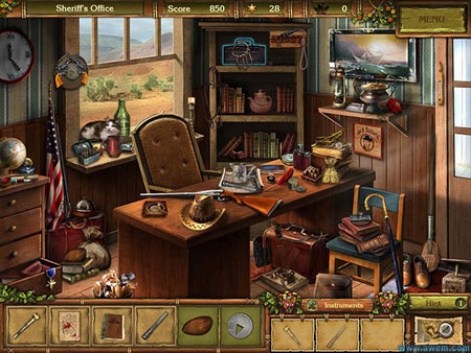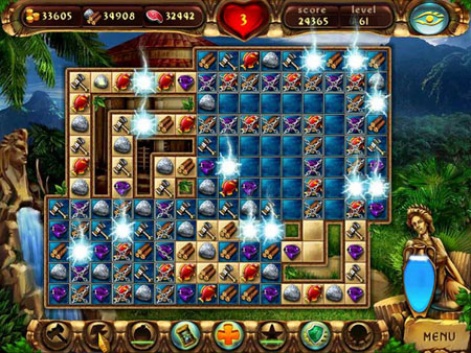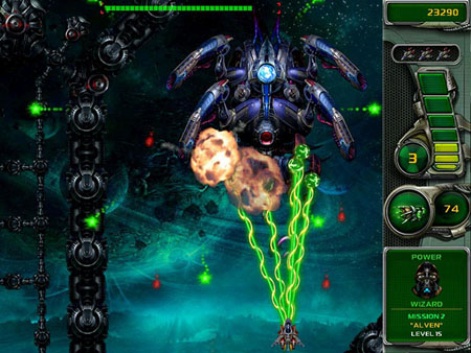Awem Games has been around since 2002.
Initially making core PC games, the Mogilev-based company quickly moved to become a successful casual developer of match-3 and hidden object games.
Now it's totally focused on mobile devices, especially iPad.
We caught up with founder and CEO Oleg Rogovenko to find out more.
Pocket Gamer: What have been the big changes for Awem over its history?
Oleg Rogovenko: We've hardly had a year without significant changes.
In 2005, the successful release of Star Defender 2 let us acquire our own office and enabled us to concentrate completely on game development.
Space shooters became our main genre. The company grew from 2 to 6 people and we made the first step on the way to the formation of Awem as an independent company.
In 2006, we experimented with genres and tried something more casual - match-3. As the result, we created the hit game Cradle Of Rome, which was the first installment of our popular series. After this success, the company completely reoriented toward casual users.
Then in 2007, the success of Cradle Of Rome encouraged further company growth. We started working in a new genre - hidden object games.
Titles such as Golden Trails and Letters from Nowhere were the result of this decision. This encouraged us to feel more confident about the game market despite the up and downs in consumer interest in these genres.

Hidden object game Golden Trails
In 2010, the company went through a growth crisis. The number of people increased up to 40, and we needed new approaches towards management and processes. The company re-evaluated its strategy and management structure, becoming more mature and stable.
We didn't become bureaucratic though, which stopped us from being buried under the heaps of monthly reports. We remain the same flexible, united, and efficient company we'd been before.
Then last year, after our first experiments on the iOS platform, Awem started to move from the PC to the mobile market. We published a whole range of products for iOS and Android. This corresponds to our aim 'to develop high quality casual games for the whole family.'
Right now there are 65 people working at Awem Games, and we keep growing.
How hard was it to make that early switch from shooters to casual games?
Most of people working at Awem at that time were experienced gamers with midcore and hardcore backgrounds. You know how popular such games were in 'pre-casual' times.
It was really hard to start thinking differently. For example, our artists were not used to drawing apples and flowers after space ships and monster aliens!
But step by step, we formed the understanding of the market. We gradually learned to keep to what our players enjoy and found the balance between our and players interests. We found a middle ground, as it seems to us, in Cradle Of Rome and tried keeping to it in our future work.
After we mastered producing match-3 games, it was much easier to work on hidden object games. We're also looking to experiment with other casual genres in future.
The Cradle franchise has been very successful. How did you get the idea that series?
Strangely enough, the idea of building a city in Cradle of Rome emerged from our Age Of Empires experience.

Cradle of Rome
By linking the match-3 mechanics and collecting resources, we got a simple but very addictive gameplay concept, which became the decisive one for the entire series, and probably for many other games with similar mechanics. And we still see a great potential in it.
How difficult was the switch to mobile games?
We released our first iPad game Star Defender 3 back in 2011. It was just a port, without crucial changes in the main gameplay.
At that time, we looked at the mobile market as just at another market. Although even then people talked a lot about its potential, as a successful PC and Mac developer, it took us time to realise it.
At the beginning of 2012, having released a couple of iPad titles and watching the growth of the mobile market, we took the decision to re-orientate the company towards the development of mobile games.
After 10 years of developing PC and Mac games, this wasn't an easy thing to do. New approaches towards design, mechanics, monetisation models, and the promotion of our products caused crucial changes in the company.
Each employee had to examine an entirely new area and get used to new benchmarks in the development process. It took a lot of effort but now we can proudly say that we've done it!
Have you noticed any difference in terms of which games are popular on PC and which have been popular on phones and tablets?
There are some differences between mobile players and computer players. Nevertheless, we noticed that a big part of our PC users have acquired smartphones or tablets.
Entering the mobile market made us revise our approaches towards design, monetisation, social functions, and channels of communication with users. Nevertheless, the games that are popular on PC and Mac show comparable results on mobile platforms.
In fact, at the moment, we don't have PC projects in development, but we'll seriously consider the possibility of porting our mobile games to PC and Mac platforms.
Do you focus particularly on iPad?
We chose iPad as the best platform to make our start in mobile for several reasons.
The relatively big iPad screens transferred our PC portfolio in the best way. Porting our first PC projects to iPad was much less time consuming from the technical point of view too; therefore, we could do it faster.
Also, iPad was a better platform because there was less competition, which was very important for us as a developer starting out in mobile.
Even now, iPads and tablets in general, remain the main platform for some of our projects. But, in terms of company strategy, we are planning to develop multi-platform games that can please both smartphone and tablet users.
How are you finding Android as a platform?
Making our first steps on Android, we experienced the problem of the large variety of devices and finding ways of monetising users. There are also difference in terms of product promotion.

To-date, Awem has focused on games like Star Defender for Android
Despite the difficulties, though, we are sure Android is a strong platform. We don't have a dilemma to produce our games for iOS or for Android. Our future projects are going to be multi-platform.
Also, we keep a close watch on Microsoft, BlackBerry, and other mobile platforms. We think there can be surprises from these companies, and developers who are able to react first to these surprises will have an advantage.
This is more than the obvious marketing benefits. It's convenient for our users who can compete in the same game with friends no matter what device they play on.
How has Awem come to terms with the free-to-play business model?
We don't focus on a particular business model, but try to create the highest quality games for the largest number of platforms and users.
When we started making mobile games two years, we considered the free-to-play model, but we weren't sure our users were ready for it.
Of course, it's often thought of as the best way to monetise a player and earn money. This is important for us, but we also like the model because you can attract more users, and gain more attention for our company and products.
So in our first free-to-play games, we don't intend to introduce intrusive monetisation but look to give players more opportunities to play for free and build a long-term relationship with us. In our mind, a loyal community is the key to success in the market.
You're based in Belarus. What's it like to operate a business from that part of the world?
In general, we don't think location is crucial.
There are some rigid legislation in terms of financial regulations and taxes in Republic of Belarus, but this doesn't prevent 'transparent' companies from operating well.
Indeed, the government of Belarus has adopted a couple of laws encouraging the development of the IT sphere, which makes our work easier.
So, while some app stores don't work with Belarus, and we can't register for them as Belarusian developer, these are only isolated problems.
How do you recruit staff?
Each year it becomes harder to find good specialists. Belarus is a small country where there isn't much special IT education. Most specialists are concentrated in the capital, Minsk, so we do our best to attract people and create perfect working conditions.
[Awem is based in Belarus' third largest city, Mogilev.] This does constrains company growth.
Yet, we can say that Awem Games is a very harmonious and highly skilled company, where people do not just work but live a full life. Well coordinated team work and friendly atmosphere are our key values.
We don't want to open an office in the US, or become a company with 500 employees. This would be another level of business, which we don't seek.
It's more important for us to create the atmosphere for personal and professional growth of each employee, and develop the company intensively rather than extensively.
As they say a bird in the hand is worth two in the bush.
What mobile games should we be looking out for from Awem in 2013?
As well as a couple of iOS and Android ports, this year we plan to release three new free-to-play projects.
Age of Rome is a match-3 games with crisp vector graphics, offering short sessions, a strong competing component, thanks to its social network integration.
Cradle of Empires is a game in which we're going to develop the idea of city building, add a quest system and a whole range of other features which will enrich gameplay experience with match-3 levels and more.
We also have another great experimental project up our sleeve, which is going to be a surprise for our users.
All these projects have their roots in our PC games, but they are going to be completely new games in which both new and old players will find something exciting.
Thanks to Oleg for his time.
You can find out more about Awem via its website.





















